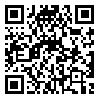Volume 34, Issue 4 (12-2025)
JGUMS 2025, 34(4): 370-381 |
Back to browse issues page
Research code: 193140008101
Ethics code: IR.GUMS.REC.1401.080
Download citation:
BibTeX | RIS | EndNote | Medlars | ProCite | Reference Manager | RefWorks
Send citation to:



BibTeX | RIS | EndNote | Medlars | ProCite | Reference Manager | RefWorks
Send citation to:
Golipoor M, Rafat Z, Asgari F, Mohammadi Z, Roostaei D. Evaluation of the quality of virtual education of basic medical sciences courses in GUMS. JGUMS 2025; 34 (4) :370-381
URL: http://journal.gums.ac.ir/article-1-2762-en.html
URL: http://journal.gums.ac.ir/article-1-2762-en.html
1- Department of Anatomy, School of Medicine, Guilan University of Medical Sciences, Rasht, Iran.
2- Department of Medical Parasitology and Mycology, School of Medicine, Guilan University of Medical Sciences, Rasht, Iran.
3- Department of Nursing, Medical Education Research Center (MERC), School of Nursing and Midwifery, Guilan University of Medical Sciences, Rasht, Iran.
4- Student Research Committee, Anzali International Medical Campus, Guilan University of Medical Sciences, Anzali, Iran.
5- Department of Pharmacology, School of Medicine, Guilan University of Medical Sciences, Rasht, Iran.
2- Department of Medical Parasitology and Mycology, School of Medicine, Guilan University of Medical Sciences, Rasht, Iran.
3- Department of Nursing, Medical Education Research Center (MERC), School of Nursing and Midwifery, Guilan University of Medical Sciences, Rasht, Iran.
4- Student Research Committee, Anzali International Medical Campus, Guilan University of Medical Sciences, Anzali, Iran.
5- Department of Pharmacology, School of Medicine, Guilan University of Medical Sciences, Rasht, Iran.
Abstract: (965 Views)
Background The virtual learning platform provides a high-quality and sustainable educational infrastructure. In recent years with the development of e-learning, its increasing impact on the educational system received a lot of attention.
Objective In this study, we examined the satisfaction of the status of virtual education of basic medical sciences courses in medical students at Guilan University of Medical Sciences in terms of the educational content and its organization, the interaction-evaluation, the virtual education system and user support, and the general perspective of students during 2021-2022.
Methods This cross-sectional study was conducted with the participation of 204 medical students at the basic medical sciences courses in Rasht and Anzali campuses. Participants were selected using a stratified random sampling method. To collect data, we used a 31-item online researcher-made questionnaire. The validity of the questionnaire was 0.92 and the total reliability was 0.887 based on Cronbach's alpha coefficient. Fisher, Pearson correlation, and SPSS software, version 26 were used.
Results The average score of the virtual education status of basic science courses in the flexibility dimension was 18.83±3.88, the lowest and highest scores were 7 and 25, respectively; the average score of the educational content and its organization was 26.40±4.51, the lowest and highest scores were 8 and 35, respectively; the average score of the interaction-evaluation was 40.20±8.70, the lowest and highest scores were 13 and 60, respectively; the average score of the virtual education system and user support was 13.67±3.41, the lowest and highest scores were 4 and 20, respectively; the average score of the overall students' perspective was 6.78±2.15, the lowest and highest scores were 2 and 10, respectively; and the average score of the overall educational course was 105.88±17.12, the lowest and highest scores were 39 and 150, respectively.
Conclusion In general, the satisfaction of medical students at Guilan University of Medical Sciences regarding the status of virtual education in basic science courses was acceptable. The results of this study can be effective in policy-making under the direct supervision of the Ministry of Health and universities of medical sciences.
Objective In this study, we examined the satisfaction of the status of virtual education of basic medical sciences courses in medical students at Guilan University of Medical Sciences in terms of the educational content and its organization, the interaction-evaluation, the virtual education system and user support, and the general perspective of students during 2021-2022.
Methods This cross-sectional study was conducted with the participation of 204 medical students at the basic medical sciences courses in Rasht and Anzali campuses. Participants were selected using a stratified random sampling method. To collect data, we used a 31-item online researcher-made questionnaire. The validity of the questionnaire was 0.92 and the total reliability was 0.887 based on Cronbach's alpha coefficient. Fisher, Pearson correlation, and SPSS software, version 26 were used.
Results The average score of the virtual education status of basic science courses in the flexibility dimension was 18.83±3.88, the lowest and highest scores were 7 and 25, respectively; the average score of the educational content and its organization was 26.40±4.51, the lowest and highest scores were 8 and 35, respectively; the average score of the interaction-evaluation was 40.20±8.70, the lowest and highest scores were 13 and 60, respectively; the average score of the virtual education system and user support was 13.67±3.41, the lowest and highest scores were 4 and 20, respectively; the average score of the overall students' perspective was 6.78±2.15, the lowest and highest scores were 2 and 10, respectively; and the average score of the overall educational course was 105.88±17.12, the lowest and highest scores were 39 and 150, respectively.
Conclusion In general, the satisfaction of medical students at Guilan University of Medical Sciences regarding the status of virtual education in basic science courses was acceptable. The results of this study can be effective in policy-making under the direct supervision of the Ministry of Health and universities of medical sciences.
Review Paper: Research |
Subject:
General
Received: 2025/01/11 | Accepted: 2025/03/11 | Published: 2026/01/1
Received: 2025/01/11 | Accepted: 2025/03/11 | Published: 2026/01/1
| Rights and permissions | |
 |
This work is licensed under a Creative Commons Attribution-NonCommercial 4.0 International License. |









